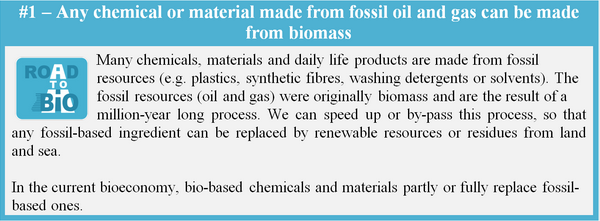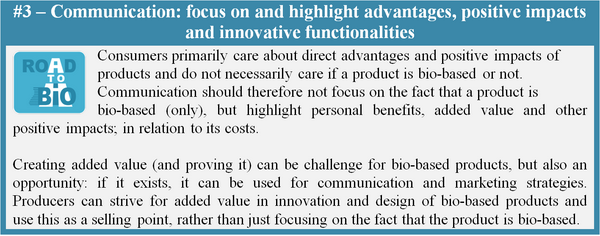Dear Reader,
Welcome to the 12th newsletter of the RoadToBio project. After a successful project meeting in Frankfurt, the team is now working full steam to bring the final roadmap to life. We strongly believe that a viable roadmap towards an increased bio-based share in the EU chemical industry requires a consensus about needs, a set of actions to satisfy those needs and a framework to help planning and coordinating the developments. In this newsletter, we will talk about deliverable D2.4 “Ways to overcome regulatory and acceptance hurdles”, as one piece in the puzzle on our way to identifying and recommend actions.
We hope you enjoy the read and wish you a good start into the Christmas season!
Christopher vom Berg
nova-Institut GmbH
On behalf of the RoadToBio consortium
Please consider – if not done already – to subscribe to the RoadToBio newsletter.
The chemical industry of Europe is not only confronted with economic pressure and competition from the global market, but also several big societal challenges. Some examples are the climate goals of the EU following the Paris agreement or increasing awareness and demand for sustainability in the European society. The goal of the RoadToBio project, increasing the market share of bio-based raw materials in the chemical industry, is an option that can support, and already is supporting, the above-mentioned trends.
In three prior reports of this project (RoadToBio deliverables D 2.1, 2.2 and 2.3) various policy and societal barriers to increase the bio-based share of the chemical industry have been identified. In deliverable D2.4, we have also incorporated societal needs, as defined in the Sustainable Development Goals, to which the chemical industry can contribute to.
Based on the identified barriers and needs, we started to work on identifying actions that can be recommended. This included for example intensive literature review, discussion with other projects on similar topics, internal discussions and short questionnaires to interested stakeholders. In June, a first set of recommendations was presented to our Industry Expert Group, and based on their feedback, the recommendations were further refined and polished.
For the final deliverable, we have split the recommendations into:
- Key messages about bio-based chemicals, materials and products
- Recommendations to overcome policy barriers
- Recommendations to overcome societal barriers, including recommendations on communication
Both key messages and recommendations are built up the same way: First, a central sentence is intended to function as a “key” message or recommendation, summarizing the main argument in one short and concise statement. Second, each statement is then backed up by further information and clarification.
The key messages are intended as an instrument for the chemical industry to address target audiences in their communication about bio-based chemicals, materials and products. They can be customized by each stakeholder to highlight product characteristics and tailor-fitted to the respective audience. Examples would be consumers along the entire value chain of the chemical industry. Below you can see the first key message:

As you can hopefully see, the message is designed in a way that supports communication with the wider public. The message in the header is what we consider a useful fact to share with the public, while the provided additional information helps to shape the argument.
With the recommendations we aim to provide the chemical industry with ideas and approaches how to tackle the barriers we have identified in prior studies. We have decided to split the recommendations into a “policy barrier” and a “societal barrier” part, partly because addressing them requires approaching different stakeholder groups. Below, you will find one of our recommendations for the societal barriers:

The difference to the above key message is, that we now give a direct recommendation to the chemical industry. We identified as one societal barrier that consumers only care little about whether something is bio-based or not, and as a consequence recommend to focus on other aspects of the product, for example reduced greenhouse gas emissions, increased sustainability or maybe even better product properties.
In summary, the key messages provide a basis to start developing communication tools/campaigns in favour of bio-based chemicals, materials and products and should be specifically tailored, dependent on the organization that wants to use key messages and the target audience of that organization. The recommendations have been developed to highlight different avenues which the chemical industry could pursue in order to tackle regulatory and societal barriers that hamper a higher share of bio-based resources in organic chemistry.
If you are interested in our full set of key messages and recommendations, just follow this link to download the deliverable.
As a final note: It is our intention to put the key messages and recommendations into the final roadmap of the RoadToBio project. You have read one of our messages and did not agree? You agree with a statement but feel like it could be further refined? You have an idea for another key message or recommendation that has not been mentioned in the deliverable?
Please do not hesitate to share your thoughts with us! We are very interested in and will consider any feedback for the final roadmap development.
What you can expect from the next newsletter
The next newsletter in January will give a first insight into the content of the roadmap. In general it will consist of three parts, the strategy document, action plan and engagement guide. If you are interested in the content of these three parts you should not read the New Year edition of our RoadToBio newsletter.
Join the network
We would like to invite you to join us on the journey to a more bio-based chemical industry. The roadmap should contain clear, realistic goals. Your knowledge and experience is necessary to create a market relevant roadmap with a high impact. Therefore, we will conduct workshops and webinars to involve you as stakeholder.
Your opinion is of utmost importance to us. Through your participation, you get the opportunity to help shape the development process and to find your opinion later in the roadmap.
How?
Visit the project website: https://www.roadtobio.eu
Subscribe to the newsletter: https://www.roadtobio.eu/newsletter
Contact us at lea.koenig@dechema.de
Introduction of the RoadToBio Team
The consortium of this two-year project, which started in May 2017, consists of four members:
– DECHEMA Gesellschaft für Chemische Technik und Biotechnologie e.V.,
– BTG Biomass Technology Group BV,
– E4tech (UK) Ltd.,
– nova-Institut für politische und ökologische Innovation GmbH.
They bring in complementary expertise in relevant fields of the bioeconomy and chemical industry, covering in depth all aspects that need to be included in the roadmap.
This project has received funding from the Bio-Based Industries Joint Undertaking under the European Union’s Horizon 2020 research and innovation programme under grant agreement No. 745623.
Source
RoadToBio Newsletter November 2018, 2018-11.
Supplier
Bio-based Industries (BBI) Joint Undertaking
Biomass Technology Group BV (BTG)
DECHEMA Gesellschaft für Chemische Technik und Biotechnologie e.V.
E4tech
Horizon 2020
nova-Institut GmbH
Share
Renewable Carbon News – Daily Newsletter
Subscribe to our daily email newsletter – the world's leading newsletter on renewable materials and chemicals









